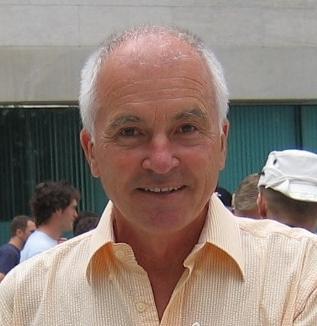ACM MSWiM 2018
TUTORIALS
The 21th ACM MSWiM Conference includes the following tutorials:
Title: Vehicular Clouds and Applications
Abstract:
Cloud computing (CC) has arisen at the confluence of a number of enabling technologies, of the availability of a chronic excess of compute resources and of the need for on-demand scalable, cheap and secure compute power that can be provided in real time. One of the appealing consequences of CC is that instead of investing in infrastructure, many businesses and individual entrepreneurs find it useful to rent the infrastructure and oftentimes the software required to run their applications.
Led by the inspiration of conventional CC, a number of papers have introduced the concept of a Vehicular Cloud, (VC) that specializes conventional CC to vehicles in a parking lot. In recent years, VCs have become an active area of research with a large number of documented applications. Similar to conventional clouds, VCs were motivated by the realization that modern vehicles have powerful on-board computers, various wireless communication capabilities and an entire panoply of sensing devices. It was also apparent that these on-board resources are chronically under-utilized. Harvesting these resources and putting them to work in a meaningful and productive way promises to have a significant and lasting societal impact.
VCs differ from conventional clouds in the ownership of compute resources. While in the case of conventional cloud service providers the compute resources have a single owner, in VCs the ownership of these resources is distributed over a large driver population. As a result of the distributed ownership of the compute and storage resources, the VC are highly dynamic. As vehicles enter the VC, fresh compute resources become available; when vehicles leave, often unexpectedly, their resources depart with them, creating a highly dynamic environment.
The vision if VC is that future vehicles with powerful on-board computers, communication capabilities, and vast sensor arrays are perfect candidates in this hyper-connected environment to utilize into a fluid cloud capable of performing large-scale computations.
VCs are still in their infancy and several of their applications are yet to be discovered. This tutorial will explore several aspects of VC research and will outline possible applications and challenges ahead.
Speaker:
 Stephan Olariu is a professor of Computer Science with Old Dominion University. He received his PhD from McGill University, Montreal, Canada. Over the years, he has held many different roles and responsibilities as a member of numerous organizations and teams. Much of his experience has been with the design and implementation of robust protocols for wireless networks and their applications. Professor Olariu is applying mathematical modeling and analytical frameworks to the resolution of problems ranging from securing communications, to predicting the behavior of complex systems, to evaluating performance of wireless networks and transportation systems. His most recent research interests are in the area of cybersecurity, vehicular clouds and the design of protocols in support of efficient transportation in smart cities.
Stephan Olariu is a professor of Computer Science with Old Dominion University. He received his PhD from McGill University, Montreal, Canada. Over the years, he has held many different roles and responsibilities as a member of numerous organizations and teams. Much of his experience has been with the design and implementation of robust protocols for wireless networks and their applications. Professor Olariu is applying mathematical modeling and analytical frameworks to the resolution of problems ranging from securing communications, to predicting the behavior of complex systems, to evaluating performance of wireless networks and transportation systems. His most recent research interests are in the area of cybersecurity, vehicular clouds and the design of protocols in support of efficient transportation in smart cities.
Title: Information-Centric Intelligent Vehicular Networks: Challenges and Guidelines
Abstract:
networking scenarios as the current advances in vehicular communication technologies and connected cars penetrate on the market. However, current data dissemination protocols and even the host-centric content delivery paradigm will not support the anticipated traffic load without degrading vehicular applications QoS/QoE. Recent research efforts are proposing the information-centric networking paradigm as a viable solution for handling multimedia content distribution in vehicular networks and connected and autonomous vehicles. This tutorial will motivate and explore the challenges, design principles and goals of information-centric content distribution for intelligent vehicular networks.We shall present the building blocks for the design of protocols for information-centric content distribution in vehicular networks. We shall discuss several challenges the information-centric networking paradigm faces in the scenarios of vehicular networks and connected cars. We shall present the current proposals in the literature and provide some guidelines for the further design of information-centric Intelligent vehicular networks. Finally, we shall conclude the talk with a discussion of research opportunities and challenges in information-centric intelligent vehicular networks.
Speakers:
 Rodolfo W. L. Coutinho is currently a Research Associate at the University of Ottawa, Canada. He received a Joint PhD Degree from the University of Ottawa and Federal University of Minas Gerais (UFMG), Brazil. He has received his Bachelor’s Degree in 2009 and his Master’s Degree in 2010, both at the Federal University of Para (UFPA), Brazil. He is conducting research in the area of underwater sensor networks, wireless networking and mobile computing.
Rodolfo W. L. Coutinho is currently a Research Associate at the University of Ottawa, Canada. He received a Joint PhD Degree from the University of Ottawa and Federal University of Minas Gerais (UFMG), Brazil. He has received his Bachelor’s Degree in 2009 and his Master’s Degree in 2010, both at the Federal University of Para (UFPA), Brazil. He is conducting research in the area of underwater sensor networks, wireless networking and mobile computing.
 Azzedine Boukerche (FIEEE, FEiC, FCAE, FAAAS) is a Distinguished University Professor and holds a Canada Research Chair Tier-1 position at the University of Ottawa. He is founding director of the PARADISE Research Laboratory and the DIVA Strategic Research Centre at the University of Ottawa. He has received the C. Gotlieb Computer Medal Award, Ontario Distinguished Researcher Award, Premier of Ontario Research Excellence Award, G. S. Glinski Award for Excellence in Research, IEEE Computer Society Golden Core Award, IEEE CS-Meritorious Award, IEEE TCPP Leaderships Award, IEEE ComSoc ASHN Leaderships and Contribution Award, and University of Ottawa Award for Excellence in Research. He serves as an Associate Editor for several IEEE transactions and ACM journals, and is also a Steering Committee Chair for several IEEE and ACM international conferences. His current research interests include wireless ad hoc and sensor networks, wireless networking and mobile computing, wireless multimedia, QoS service provisioning, performance evaluation and modeling of large-scale distributed and mobile systems, and large scale distributed and parallel discrete event simulation. He has published extensively in these areas and received several best research paper awards for his work. He is a Fellow of the Engineering Institute of Canada, a Fellow of the Canadian Academy of Engineering, and a Fellow of the American Association for the Advancement of Science.
Azzedine Boukerche (FIEEE, FEiC, FCAE, FAAAS) is a Distinguished University Professor and holds a Canada Research Chair Tier-1 position at the University of Ottawa. He is founding director of the PARADISE Research Laboratory and the DIVA Strategic Research Centre at the University of Ottawa. He has received the C. Gotlieb Computer Medal Award, Ontario Distinguished Researcher Award, Premier of Ontario Research Excellence Award, G. S. Glinski Award for Excellence in Research, IEEE Computer Society Golden Core Award, IEEE CS-Meritorious Award, IEEE TCPP Leaderships Award, IEEE ComSoc ASHN Leaderships and Contribution Award, and University of Ottawa Award for Excellence in Research. He serves as an Associate Editor for several IEEE transactions and ACM journals, and is also a Steering Committee Chair for several IEEE and ACM international conferences. His current research interests include wireless ad hoc and sensor networks, wireless networking and mobile computing, wireless multimedia, QoS service provisioning, performance evaluation and modeling of large-scale distributed and mobile systems, and large scale distributed and parallel discrete event simulation. He has published extensively in these areas and received several best research paper awards for his work. He is a Fellow of the Engineering Institute of Canada, a Fellow of the Canadian Academy of Engineering, and a Fellow of the American Association for the Advancement of Science.